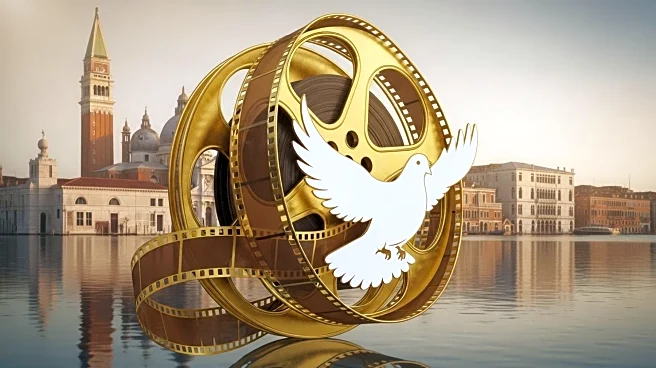What's Happening?
Thousands of pro-Palestinian activists gathered at the Venice Film Festival to protest against the ongoing war in Gaza. The demonstration, which was peaceful yet vibrant, featured participants from various regions, including France and the U.K., who marched across the Lido island. Protesters carried Palestinian, Italian, and rainbow flags, along with union and socialist banners, while chanting slogans such as 'Stop the genocide!' and 'Free Palestine!' The protest aimed to urge the festival organizers to take a stand against Israeli military actions and to amplify Palestinian voices. The march proceeded towards the Palazzo del Cinema, where Guillermo del Toro's 'Frankenstein' was set to premiere, but was halted by police before reaching the red carpet. Despite the disruption to local transport and film events, the protest remained non-violent.
Why It's Important?
The protest at the Venice Film Festival highlights the intersection of cultural events and global political issues. It underscores the growing demand for international platforms to address and take positions on geopolitical conflicts, such as the situation in Gaza. The festival, a significant event in the film industry, becomes a stage for political expression, reflecting the broader societal call for justice and representation of marginalized voices. This movement could influence how cultural institutions engage with political matters, potentially leading to increased advocacy and awareness. The protest also demonstrates the power of collective action in drawing attention to humanitarian crises, impacting public opinion and possibly influencing policy discussions.
What's Next?
The protest may prompt festival organizers and participants to reconsider their stance on political issues and the representation of Palestinian narratives in their programming. It could lead to further discussions within the film industry about the role of cultural events in political advocacy. Additionally, the demonstration might inspire similar actions at other international festivals, increasing pressure on global cultural institutions to address political conflicts. The ongoing situation in Gaza will likely continue to be a focal point for activists, potentially leading to more organized efforts to influence public discourse and policy.
Beyond the Headlines
The protest at the Venice Film Festival raises questions about the ethical responsibilities of cultural institutions in addressing global conflicts. It challenges the traditional separation between art and politics, suggesting that festivals can serve as platforms for social change. This event may contribute to a shift in how cultural events are perceived, with an increased expectation for them to engage with and respond to international issues. The protest also highlights the role of art and culture in amplifying voices from underrepresented communities, potentially leading to more inclusive and diverse narratives in the film industry.










